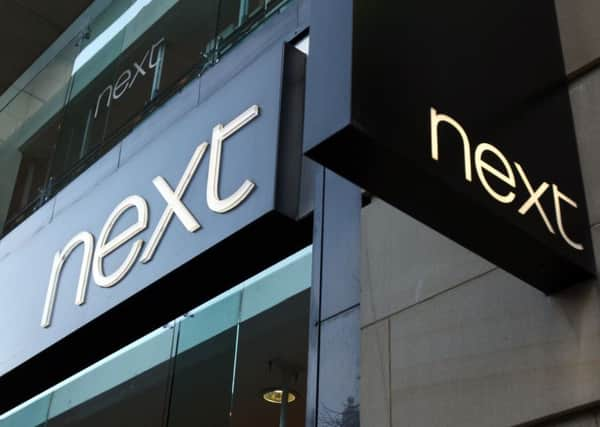Next suffers first fall in profits for eight years
This article contains affiliate links. We may earn a small commission on items purchased through this article, but that does not affect our editorial judgement.


Chief executive Lord Wolfson said other headwinds this year would be weaker growth in consumers’ real post-inflation incomes due to a weakening economy, and a continuing sectorial shift away from spending on clothing.
Advertisement
Hide AdAdvertisement
Hide AdIt came as Next reported a previously-flagged fall in underlying pre-tax profits to £790.2 million in the year to January 2017, down from £821.3m in the previous 12 months – its first yearly profit slide since the recession and financial crisis of 2008. Same-floorspace sales slid 3.8 per cent last year.
Wolfson admitted part of the shrinkage in sales was due to squeezed availability of some of its clothing staples. “In focusing so much energy on changing our buying culture, processes and adopting exciting new trends, we have omitted some of our best-selling, heartland product from our ranges,” he added.
The group said that it began overhauling its ranges last January to include more traditional items, such as work blouses, but the full impact will not be seen until this September.
The retailer is also revamping its Next Directory offering, including a Next Unlimited offer allowing UK customers to pay £20 for a year’s unlimited 24-hour delivery.
However, Wolfson said that sales were likely to remain under pressure, showing some improvement in Next’s second trading quarter before experiencing a “sea-change” in the second half of 2017 and into next January. “It’s going to be a really tough year,” he said.
Next also confirmed that it had increased its prices by 4 per cent in the first half of the current financial year, and warned prices would remain under pressure in the second half from rising buying costs caused by the Brexit-hit pound.
Total Next retail sales fell 2.9 per cent to £2.3bn, while sales from the Next Directory business rose 4.2 per cent. The total dividend is pegged at 158p via a final payment of 105p.
Advertisement
Hide AdAdvertisement
Hide AdThe retailer repeated warnings made in January that full-year profits in the current financial year could fall by as much as 14 per cent.
Shares in Next jumped on relief that the gloomy statement was not even worse. “(Next’s) valuation now offers support, despite the challenges,” said Investec Securities retailing analyst, Alistair Davies, who has upgraded his stance on the stock from “sell” to “hold”.
Next, which revealed in 2014 that its annual profits had overtaken rival Marks & Spencer for the first time, has faltered over the past two years.
Wolfson has said in the past that it is suffering from a broader slowdown in spending on clothing and footwear that it first identified two years ago, as consumers splash out on eating out and travel instead.
• Fashion chain Ted Baker has unveiled a rise in full-year sales and profits, helped by continued global expansion and stellar online growth, writes Ravender Sembhy.
Pre-tax profits rose 4.4 per cent to £61.3m in the year to 28 January, while total revenue rose 16.4 per cent, or 10.8 per cent on a constant currency basis, to £531m.
Ted Baker, which began life as a shirt store in Glasgow, opened branches in Beijing and Madrid during the period, but added that it has been impacted by increased levels of promotional activity and a fall in international tourism in the US and Canada.
Chief executive Ray Kelvin said: “We have continued to trade well and develop despite a backdrop of ongoing external challenges across our global markets. This success reflects the strength and appeal of the brand as well as the outstanding quality of our collections.”
Advertisement
Hide AdAdvertisement
Hide AdIn January, Kelvin vowed that shoppers will not be subjected to price hikes this year with the combination of hedging against currency fluctuations and a dollar-denominated income from its US operations helping to mitigate the collapse in sterling following the Brexit vote.
Ahead of last year’s referendum, Ted Baker extended its hedging arrangements to April 2018, giving it an extra breathing space compared to other retailers.
In the UK and Europe, retail sales were up 10.7 per cent to £279.5m, while in the US and Canada they grew 28.3 per cent to £103.4m. Online revenues grew 35.1 per cent to £72.3m.